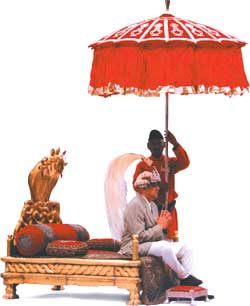 When the serpent-hooded Shah throne was dusted out for the ascension of King Gyanendra at Hanuman Dhoka last year, the future of the dynasty had never looked so uncertain. A shocked and confused populace was unwilling to accept the official explanation of the Narayanhiti massacre. Doubts were openly raised about the fate of an institution that had imploded from its own neuroses.
When the serpent-hooded Shah throne was dusted out for the ascension of King Gyanendra at Hanuman Dhoka last year, the future of the dynasty had never looked so uncertain. A shocked and confused populace was unwilling to accept the official explanation of the Narayanhiti massacre. Doubts were openly raised about the fate of an institution that had imploded from its own neuroses. In a cunning bid to cash in on the popular disenchantment, Dr Baburam Bhattarai wrote an incendiary op-ed piece for Kantipur. There were riots in the city, a curfew had to be imposed, and the army was deployed to restore order. When the Royal Commission constituted to investigate the killings submitted its report, it was received with scepticism bordering on derision. In the popular imagination, royalty came to be associated with the consumption of an "unidentified black substance" and Speaker Taranath Ranabhatt's "bhata-tata" became an onomatopoeia of the times and passed into folklore.
It's just been one short year since the brutal murders of the king and his immediate family. But it already reads like a page from history. Amazing, but true: people want to put the deaths behind them and get on with their lives. The king is once again back at the top of the power pyramid in the country, and nobody wants to taint the venerated institution with the blood of the Narayanhiti massacre-especially when the other institutions of state have turned out to be moral pygmies. Many desperately want to believe that the king is their saviour. How the mighty have fallen.
The Royal Nepal Army lost face when it failed to save the life of its Supreme Commander-in-Chief. The enemy, as it happened, was not outside the palace walls, but within. The Holleri fiasco then exposed the weakness of the defence establishment and the contradictions in our civilian-military relations. After that came Ghorahi, which shattered the illusion of the invincibility of the military, and despite later successes against the rebels , the debacle at Mangalsen was proof that this was not going to be as clean and swift as the government had hoped it would be.
The media, lawmakers, the graft-busters and the judiciary soon got into a wrangle, ostensibly over a draft law meant to check corruption. Whether the exercise helped improve the Bill is debatable-Upper House lawmaker Roop Jyoti, among others, has his reservations on the act that was later passed (see "Guilty until proven innocent," p7). But the unseemly episode has tarnished the reputation of the institutions involved. The main opposition UML won the race for infamy when it disrupted the winter parliamentary session, managing to prevent even a single sitting.
Hounded by media, chased by the opposition, undermined by the instruments of the government, and hassled by his own party-members, Girija Prasad Koirala walked out of Singha Darbar more in disgust than disgrace. Among other things, Koirala's resignation proved the powerlessness of the prime minister in a government that is supposed to have been modelled after the Westminster system.
For a section of Nepali society, including the intelligentsia, the Maoists had been a source of hope. The insurgents presented themselves as an alternative to the corrupt rule of Singha Darbar and politicians in general, and the gullible urban Nepali middle class bought the promise of utopia. But the Maoists squandered this support by using the ceasefire to regroup, reorganise, and rearm; and then in November wrecked any hope for peace by taking on the army.
In this enveloping darkness, Prime Minister Sher Bahadur Deuba's decision to impose a state of emergency was the final blow. Now, nobody other than the Maoists and the members of the security forces have any standing outside Kathmandu Valley, and a few other urban pockets of the country. The dissolution of the Lower House of parliament, the re-imposition of the state of emergency, and the relegation of the Deuba government to a partyless status all indicate the complete depoliticisation of governance.
Forget democracy, politics itself has lost its shine. It is doubtful if even Deuba believes his own promise of holding elections in November. If any voting can take place in the heavily-guarded district headquarters, it will be little more than an action replay of the Museveni-Musharraf model. It may not have been by design-let's give Deuba the benefit of the doubt-but the fact is that power is now back at the palace. Freed of parliamentary oversight and cut loose from the party, the prime minister lacks the moral authority to enforce the rule of law in the country. Despite the facade of constitutionality, it's back to rule by decree.
All eyes are now on Nirmal Niwas, the private residence of the constitutional monarch. As the king comes out of his year of mourning this week, the country awaits his next step with bated breath. Both the extreme right and the extreme left should be happy.



